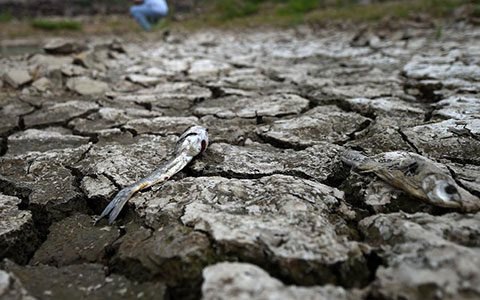The earth was never hotter than it was in June
Updated: 2015-07-22 13:02
By Amy He in New York(China Daily USA)
|
||||||||
|
A child cools off in The Bosque Fountain in New York's Battery Park on Monday. Brendan Mcdermid / Reuters |
The world experienced temperatures in June that were the highest since modern record-keeping started in 1880, according to scientists. Environmental experts said the record heat should put greater pressure on nations to tackle climate change in upcoming talks in Paris.
The average temperature on land and sea last month was 1.58 degrees Fahrenheit above the 20th century average, the highest in a 136-year period of record, according to the US' National Oceanic and Atmospheric Administration's monthly summary released on Monday. June 2015 also was the fourth month this year so far that has broken monthly temperature records, the report said, and so far, the first six months of the year have been the warmest on record.
There were record temperatures in China, with places like the Xinjiang Uygur Autonomous Region reaching 113 degrees Fahrenheit, and Hong Kong experiencing its hottest June since 1884. The United States had its second-warmest June on record. Only June 1933 was hotter. Five western states - California, Oregon, Washington, Idaho, and Utah - were all record warm.
The heat is partially due to El Nio, the warming of the ocean along the equator that can create influxes in weather patterns across the planet, causing unusual weather events.
But experts said that El Nio alone can't be the only reason for the warm temperatures - 2014 was also a record year with temperatures and the El Nio was not present - which they said strengthens the need for positive climate change discussions at the United Nations Climate Change Conference in Paris in December. Then 196 countries will meet to sign a legally binding climate change agreement.
"This is a story that we've been hearing over and over again and El Nio alone can't account for the full global warming that we're seeing. We know that 14 of the 15 warmest years have occurred since 2000, and the trends we've been seeing suggest that El Nio alone can't really explain this," said Kelly Levin, senior associate at think tank World Resources Institute.
"What it does suggest is that given the trends in warming and the amount of greenhouse gas emissions that we're pumping into the atmosphere every year, that it is likely that 2015 could again be a record warm year," she said.
Levin said that the record warmth - experienced in the western parts of the US and across China, as well as parts of South America and Africa - will hopefully continue to be "wake-up signs" to decision makers that meet in Paris to reach agreement to phase out emissions.
"Especially in the lead-up to Paris and coming out of the New York summit last year, there certainly is a lot of momentum. We know we need more, we know we need more quickly, and I think the hope is that we'll come out with a very strong agreement in December that not only brings countries back to the table repeatedly, to set commitments over five-year cycles, but also has a long-term goal to phase our emissions," and to provide those signals to governments around the world as well as the private sector to really transform their economies, she said.
Clayton Munnings, a research associate at think tank Resources for the Future, said that climate negotiators will view recent high temperatures as a symptom of the climate change issue.
"I think the negotiators are likely to see the increase in temperature as a symptom of the disease that they're all collectively trying to cure, which is excess global warming and climate change. It might personally motivate some negotiators, it might compel some advocacy groups to put more pressure on negotiators," he told China Daily.
But Munnings also said that ultimately the warmer temperatures - which have been rising consistently over the last few years - won't fundamentally change negotiations, though the China-US partnership on climate targets has been "very encouraging."
The two countries announced in November plans to curb emissions. The US said it will reduce carbon emissions by 26 to 28 percent in 2025, compared with 2005s. China announced that it would peak emissions by 2030.
amyhe@chinadailyusa.com

 UN displays Chinese actress Gong Li's portrait at exhibit
UN displays Chinese actress Gong Li's portrait at exhibit
 Family wades across flood to catch train
Family wades across flood to catch train
 Drought hits NE China
Drought hits NE China
 Firefighters launch Hollywood-style posters
Firefighters launch Hollywood-style posters
 Man overcomes disabilities to build thriving business
Man overcomes disabilities to build thriving business
 Rare imperial porcelain revealed for first time in Capital Museum
Rare imperial porcelain revealed for first time in Capital Museum
 Cosplay enthusiasts pose during 'Anime Friends' in Brazil
Cosplay enthusiasts pose during 'Anime Friends' in Brazil
 Top 10 services changed by online-to-offline
Top 10 services changed by online-to-offline
Most Viewed
Editor's Picks

|

|

|

|

|

|
Today's Top News
Xi, Obama exchange views on visit, Iran over phone
Wading through South China Sea sticking points
Drought forces Californians to make lifestyle changes
Thousands flock to donate sperm on Taobao's new service
Ling Jihua's arrest a vital lesson for officials
Cuba, US ties called first step
Life details of Tennessee shooter emerge, but motive elusive
China can now shop at JD.com's US Mall
US Weekly

|

|







